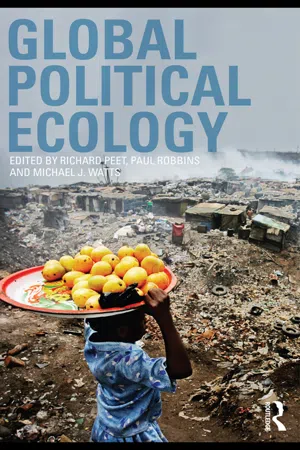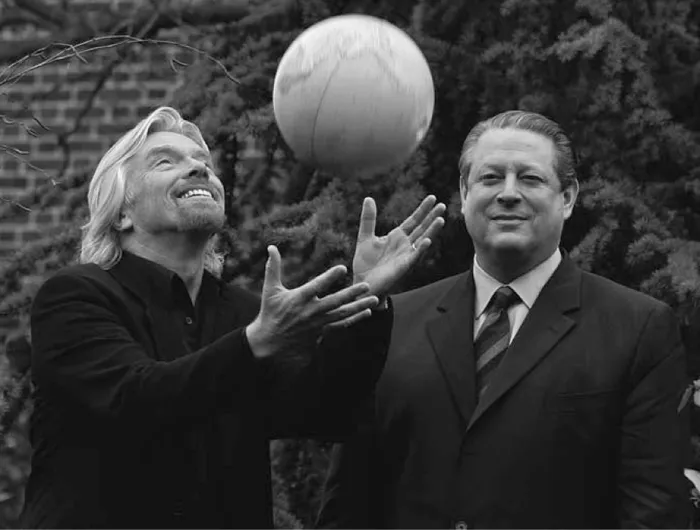Introduction: global warming as paradigm
It is a striking image. A global capitalist whose personal wealth is rooted in an industry, air transportation, distinguished by its massive carbon footprint, and a Nobel prize winning US politician and former Vice-President, honored for his contributions in placing global climate change, and the scientific work of the Intergovernmental Panel on Climate Change (IPCC) in particular, on the global political agenda. Tossing the globe into the air, British tycoon Sir Richard Branson announced to the world in 2007 that he was offering a $25 million prize for the scientist who discovers a way of extracting greenhouse gases from the atmosphere
– a challenge to find the world’s first viable design to capture and remove carbon dioxide from the air. Big Science meets Big Business meets Big Politics. But the prize – known as the Virgin Earth Challenge – was immediately attacked by a leading climate scientist, Kevin Anderson, of the Tyndall Centre for Climate Change Research at Manchester University, who offered the following assessment of Sir Richard’s philanthropy: “He’s misguided, misinformed and potentially quite dangerous in making people think there is some great technological hope out there.” Sir Richard, accused of rank hypocrisy for creating a prize based on the profits of a firm and an industry responsible for massive carbon releases, replied: “I could ground my airline today, but British Airways would simply take its place” (The Guardian February 7th 2007; http://www.guardian.co.uk/environment/2007/feb/10/theairlineindustry.climatechange). Well, as a Berkeley bumper stick it has it: “At least the war on the environment is going well.”
The photograph is above all a planetary image, in its own way a bookend to the famous NASA planet earth photograph AS17–22727 taken during the final Apollo mission in 1972. It is a picturing, or rendering, of a certain sort of global nature, global politics and global science all at once. If the NASA image came to be the lodestar for the United Nations Convention on the Human Environment held in Stockholm in 1972, perhaps the Branson-Gore photography captured perfectly the sentiments of the December 2009 UN Climate Conference in Copenhagen (COP15). Copenhagen was obviously not the first global forum in which big science, big politics, and big business have joined forces to address the conundrum of growth without limits and capitalism’s massive material wastes and detritus – the “externalities” associated with converting the land, ocean and atmosphere into a global dumping ground. But the invocation of planet earth and 1960s crisis thinking about the environment in the run up to Copenhagen is historically resonant. Released in 1972 in the same year as the Stockholm Earth Summit, the famous Limits to Growth report – penned by a quartet of MIT physicists, cyberneticians and business management theorists – represented the apotheosis of a form of crisis thinking driven by a deep Malthusianism. On offer was a powerful discourse offering the prospect of chaos and collapse rooted in demographically driven scarcity (the five key sub systems calibrated in their World3 computer model were world population, industrialization, pollution, food production and resource depletion).1 The global modeling exercise of Limits to Growth proved to be flawed in all sorts of ways but with the vantage of hindsight we can now see that it was prescient. In genealogical terms, the sort of “limits modeling” of the 1960s and early 1970s reappears in the general atmospheric circulation models (GCMs) of the 1990s. As they gained standing and analytical power, the new wave of global climate change models, without which there would have been no Montreal or Kyoto Protocols or COP15, were draped in the language of crisis and apocalypse. As Iain Boal put it “at COP15 it would be fair to say that versions of a secularised neo-catastrophism will be the dominant paradigm among climate scientists and laity alike” (2009: 3).
Implicit in the science behind the global climate change debate – there are after all doubters and legitimate scientific differences which have doubtless been exaggerated in the popular imagination by the release of the now famous e-mails from University of East Anglia climate scientists – is a worldview somewhat at odds with the Darwinian orthodoxy of evolutionary gradualism (Weart 2004; Boal 2009). Climate could, and did of course, change historically, but for human occupation and livelihood this represented a deep historical time – the very longue durée. On offer now is something unimaginable until recently, namely abrupt and radical shifts. It is a science of planetary disaster demanding a response – political, policy, civic and business – of an equal and opposite magnitude and gravity. Here is Al Gore on the matter: “What we are facing is a planetary emergency. So some things you would never consider otherwise, it makes sense to consider.” We heard this same rhetoric in the wake of 9/11. What might the planetary ecological crisis entail?
In a discursive sense, then, climate change as a planetary emergency mobilizes powerful actors around the threat of massive risks and uncertainties. It is rather like the War on Terror, Ebola or nuclear weaponry and is fully consistent with what has been called a “culture of fear” (see Glassner 2000). Planetary challenges, however they are assessed and weighed empirically, are capable of eliciting very different responses. Climate change after all could entail a serious and multi-lateral push toward a zero-carbon economy or a privatized and corporate push to synthetic chemistry, “clean fuel” and nuclear energy.
Global climate change – as science, policy and politics – reveals starkly the sorts of problems that a global political ecology – the subject matter of this book – must confront. One can start with IPCC itself as a sort of transnational scientific network operating too as an advocacy group on a public landscape populated by a significant corporate (and Republican Party in the US) presence of climate change deniers. The scientific consensus is that humans have changed the chemistry of the earth’s atmosphere, primarily by altering the concentration of CO2 from pre-industrial levels of 280 parts per million to its current (and rising) level of over 400 (we discuss this at greater length later). But the very idea of human-induced climate change was contested from the very moment, in the 1980s, when it became a respectable matter of science. Oreskes and Conway (2008) have shown how the Marshall Institute (MI) in Washington DC played a key role in the denial industry long before ExxonMobil and other oil companies, and indeed the George W. Bush administration, joined the denier fray. Populated by a group of retired physicists, the MI was an archetypical Cold War think tank devoted to what they saw as exposing scientific uncertainty and skepticism. They cut their teeth on Reagan’s Strategic Defense Initiative (SDI) and what they saw as unprincipled scientific opposition to it. From the 1980s onward MI was a powerful voice (with robust Republican Party connections) in denying a raft of “uncertainties”: that smoking causes cancer, that pollution causes acid rain, that CFCs destroy ozone, and that green gas emissions cause global warming. Behind this was the view that all scientific knowledge revealing alleged ecological or health costs was in the service of central planning and socialism! One of MI’s founders, Fred Singer, articulated the view that behind the scientific work for global warming lay a “hidden political agenda” against “the free market…capitalistic system” (quoted in Oreskes and Conway 2008: 77). Lahsen (2004) has suggested that the science of global climate change denial more generally was rooted in the “paranoid style” (the term is from Richard Hofstader) of American politics: science and environmentalism were out to get market fundamentalism. In a sense they were right of course. Capitalism would have to change if it were to seriously address its own impact on the planet, something that institutions like the Marshall Institute could never accept.
The production of particular sorts of knowledge to discredit scientific orthodoxy speaks to not only questions of how environmental knowledge is produced and legitimated, but also to what Robert Proctor and Lnda Schiebinger (2008) call “agnotology,” namely the willful production of ignorance and scientific ambiguity. One part of this story has to do with the extent to which corporate capital not only represent themselves as particular sorts of actors. We are thinking of BP’s re-branding itself as “Beyond Petroleum” or Chevron’s media barrage on the company’s role in the clean energy transition. But also the extent to which they have their own in-house science – both sponsored research of the sort undertaken by the tobacco companies in their infamous denial of the links between smoking and cancer, and in-house corporate research programs of their own, as in the case of risk and reinsurance industries financing their own climate modeling on hurricane risks. What sort of knowledge is produced, in other words, and its legitimacy and authority, are central to the ways in which global environmental problems become, or do not become, “problems” and how they are construed and composed. How transnational scientific networks produce consensus amidst such scientific and popular contention – how epistemic communities (Haas 1992) are created, sustained and mobilized – is central to the IPCC story. But for every case of corporate climate change denial there is probably an equally problematic set of epistemological questions about how science is “reframed” in speaking truth to power. The disclosures that University of East Anglia climate scientists played “tricks” in presenting their data to the public and policy makers is a case in point. In other words, it is striking not only how “knowledge has emerged as a salient theme in projects of environmental governance” (Jasanoff and Martello 2004: 336) but also how a purportedly global or universal science is at the same time a “situated knowledge” (Haraway 1989), situated with respect to power and situated with respect to local knowledge-power formations (Jasanoff and Martello 2004).
The Framework Convention of Climate Change (UNFCC) which the UN adopted at the Rio Earth Summit is now eighteen years old. Its basic mission was to achieve the stabilization of greenhouse gas concentrations in the atmosphere at a level that would prevent dangerous anthropogenic interference with the climate system. The Kyoto Protocol, signed in 1997, to come into force in 2005, was established to realize these goals. CO2 emissions are now 30 percent higher than when the UNFCC was signed; atmospheric concentrations of CO2 equivalents are currently 430 parts per million (Gautier 2008; IPCC 2000). At the current rate they could more than treble by the end of the century. In effect this would mean a 50 percent risk of global temperature increases of 5 degrees C (the average global temperature now for example is only 5 degrees C warmer than the last ice age: see the Economist December 5th 2009: 3). Kyoto was of course a failure, in large measure because of the non-signatory states like the US. It is due to expire in 2012, and implementing a new treaty is expected to take three years. Much therefore rested on the Copenhagen Conference held in December 2009. As the Economist put it “without a new global agreement there is not much chance of averting serious climate change” (December 9th 2009: 3). Earlier in 2009 a G8 meeting agreed that increase in global temperatures should be no more than 2 degrees C above pre-industrial levels. According to IPCC calculations, this would involve cutting global emissions to half their 1990 levels by 2050 (for richer countries, this means a reduction to 2 tons of carbon per head from levels above 10 in Europe and 24 in the US). IPCC figures suggest the global south must cut emissions by 25–40 percent by 2020 (IPCC 2000).
The prospect of a meaningful and robust COP15 agreement turned on how the US under President Obama (after eight years of resistance from the Bush administration) and China could deliver on emissions reductions, and al...

